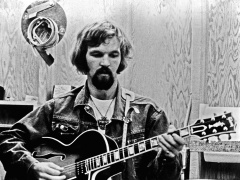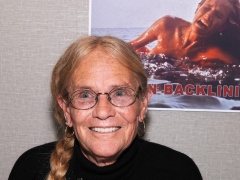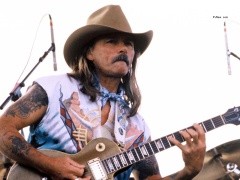
Glen Lockett, better known professionally as Spot, a producer and engineer of some of the most crucial punk and post-punk records of the early 1980s, has died at 72, friends have /confirm/ied.
Spot was behind the boards for most of the essential SST Records releases that put that L.A.-based independent label on the map between 1980-85, including such scene-changing recordings as Husker Du‘s “Zen Arcade” and “New Day Rising,” Black Flag‘s “Damaged” and “Jealous Again,” and albums by the Minutemen, the Meat Puppets, the Descendents, Saccharine Trust and the Misfits.
Joe Carducci, a co-owner of the SST label during the period when Spot was the imprint’s unofficial house producer, announced the death in a Facebook post, saying Spot had been found dead shortly after 10 a.m. Saturday at a health care facility in Sheboygan, Wisconsin. According to Carducci, Spot had suffered from fibrosis and was on oxygen for impaired lung function, and “was hoping for a lung transplant” prior to his condition worsening when he was hospitalized after a stroke three months ago.
Mike Watt, of Minutemen fame, posted on Twitter: “Good people, we just lost my old buddy Spotski, a terrible blow. he recorded the Minutemen’s first stuff, I go way back w/this man. Brother matt took this shot six years ago when Spotski came to visit our Pedro town… man, this is a terrible blow. I love you Spotski forever.”
good people, we just lost my old buddy spotski, a terrible blow. he recorded the minutemen's first stuff, I go way back w/this man. brother matt took this shot six years ago when spotski came to visit our pedro town… man, this is a terrible blow. I love you spotski forever. pic.twitter/8Ibn0JrakQ
— mike watt (@wattfrompedro) March 4, 2023
Keith Morris, Black Flag’s original lead singer, paid tribute with a Facebook photo of D. Boon kissing Spot on the cheek, writing, “SPOT’s gone. R.I.P. Mr. Lockett you were a good dude!”
Wrote Carducci, “SPOT was a musician and writer and photographer who spelled his name in all caps with a dot in the middle of the O. His principal sideline was as a record producer-engineer and an architect of the natural approach to recording a band in the punk era. He started in Hermosa Beach playing and recording jazz and he took the primacy of live jazz playing into recording bands against prevailing attempts to soften or industrialize a back-to-basics arts movement in sound. When approaching the mixing board, SPOT would assume an Elvis-like stance and then, gesturing toward all the knobs, he would say in a Louis Armstrong-like voice, ‘This is going to be gelatinous!'”
Spot was also well-known as a photographer whose working documenting the South Bay in the late ’70s and ’80s had been the focus of books and gallery exhibits. A hardbound edition of photos from that place and era, “Sounds of Two Eyes Opening,” was published in 2014.
Carducci wrote that “SPOT didn’t dwell a lot on his personal history,” but he recounted details that he knew of his former SST comrade, saying he was born in Los Angeles to a Tuskegee airman father and a Native American mother. Raised in the Crenshaw area, Spot moved to Hermosa Beach in the mid-’70s, and then, as the golden era of SST wound down in the mid-’80s, decamped from L.A. to Austin and then Sheboygan (“to be near his favorite Celtic music scenes in Milwaukee and Chicago,” Carducci said).
Spot was also a writer as well as photographer, whose work appeared in the Hermosa Beach-based free weekly the Easy Reader in the late ’70s. At that time, he was an avid roller skater, as well as a documentarian of the South Bay’s skating culture.
Jazz was one of Spot’s first loves. “I’d been raised listening to post-bebop jazz,” he said in an interview with Red Bull Music Academy. “Going back into the ’50s, I’d be at family barbecues where they’re playing Thelonious Monk, and stuff like that.” In the ’70s, he said, “I was really enamored with a lot of what I guess you would call progressive rock. That whole era with concept albums, when jazz fusion started happening, before it turned into bullshit.”
He found work at a new studio being built in Hermosa Beach, the Media Arts Studio, and began to learn the ropes as musical scenes quickly changed. In a 2018 interview, he told Easy Reader, “I just walked up the stairs and said, ‘Well I hear you’re building a studio. I’m looking for a studio to do something in.’ It was way in its early stages, in the grunt work of doing construction and building it. But when I saw what was up there, I immediately saw the potential of what could be there.”
A chance meeting with Black Flag guitarist and future SST co-owner Greg Ginn while he was moonlighting as a waiter at the vegetarian restaurant Garden of Eden changed everything. Ginn, who had been reading Spot’s reviews in the Easy Reader, challenged him. “(Ginn) would say, ‘Why aren’t you looking at all these other bands?’ I thought there was really no independent scene worth talking about, but he was on to a whole new thing.” Watching a small riot break out in Manhattan Beach’s Polliwog Park while Black Flag did an early gig there lit Spot up. He remembered thinking, “I got to record this band before they get killed'” — leading to that band’s all-important 1980 EP “Jealous Again.”
Of SST’s no-budget operation, he said, “We had to go in there, get things set up quick, go through the tracks quick, and then get the stuff mixed quick, because that was all the time and all the money we had to work with. It had to get done.”There was little time, money or philosophical inclination to tinker over production. “Everything was based on the idea of playing the music right when you were playing it live, and then recording that,” he said. Talking about Husker Du’s highly influential double album “Zen Arcade,” he said, “The entire session, from basic tracks to final mix, was roughly about a hundred hours. Which is not very much time at all. None of it was perfect. But we just had to get it done.”
Spot split with SST in 1986, telling the Red Bull interviewer, “The dynamic of how the label functioned, under that model, just didn’t work too well. I worked with them until I kinda couldn’t work with them anymore. It’s really sad.”
In 2018, Spot returned to Hermosa Beach for an exhibit at the Pacific Coast Gallery in downtown Hermosa titled “Ride the Wild Wheels,”at which time fine-art prints of his 1970s and ’80s work were also sold.
In 2019, he served as the narrator of an audiobook novel by G.S. Oldman titled “The Decline and Fall of Alternative Civilization,” which satirized South by Southwest and other components of the alternative rock scene that had succeeded punk and post-punk.
Said Spot in a 2018 interview with his alma mater newspaper, Easy Reader, “People have always asked, ‘When you’re recording a band, how do you make that moment happen?’ No, you don’t make that moment happen. You just set things in motion that will allow the thing to happen. It’s like theater I guess: Something is going to happen on that stage, but you’ve gotta make that stage invite the moment. And when it happens, you’ve got to recognize it.”






